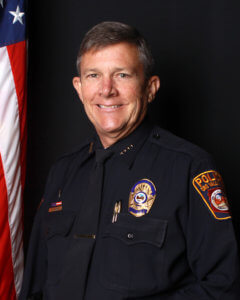Chief Danny Sharp – Oro Valley, AZ Police Department
Chair – IACP Highway Safety Committee
In the 40 years since MADD’s creation, impaired driving crashes have continued to cause unnecessary death and injury, affecting the lives of hundreds of thousands of people.
The National Highway Traffic Safety Administration (NHTSA) reported 36,560 people were killed in car crashes in 2018. Impaired driving crashes killed 10,511 people; resulting in 28.75% of all fatalities that same year.
This is an unconscionable number to grasp when you realize that 100% of impaired driving crashes are preventable.
If enforcing alcohol impairment wasn’t difficult enough, increases in poly-substance abuse through the availability of synthetic opioids, over-the-counter medications, prescription drugs, low cost methamphetamines and the legalization of marijuana, have created challenges for law enforcement in their attempt to effectively investigate and arrest impaired drivers.
In addition to complex roadside investigations, prosecutors are also having a difficult time in court explaining how poly-substance abuse affects impaired drivers and in many cases, they are having to forgo prosecution due to low BAC’s not hitting the presumptive limit.
The International Association of Chiefs of Police (IACP) Technical Advisory Panel (TAP), in collaboration with NHTSA, have been working hard to train drug recognition experts (DRE’s) across the country in an effort to improve drug identification and enforcement. NHTSA’s Advanced Roadside Impaired Driving Enforcement (ARIDE) courses are also being taught nationwide to bridge the gap between Standard Field Sobriety Testing (SFST) and the Drug Evaluation and Classification (DEC) Program. This program is also offered to other criminal justice professionals, such as prosecutors, in hopes of training them to better illustrate and understand the signs of impairment related to poly-substance use. Police officers and prosecutors alike have to become more technically trained if we hope to reduce impaired driving crashes.
As of October 2019, there were only 9,170 DRE’s worldwide. California Highway Patrol leads the nation with 1,894 DRE’s. Due to marijuana legalization in Canada, the Royal Canadian Mounted Police and Ontario Provincial Police are aggressively training new DRE’s. Currently, the two organizations are hosting 25 DRE’s schools each year with the goal of adding 400 DRE’s annually.
Law enforcement needs more certified DRE’s if we hope to combat poly-substance impaired driving. I encourage all police departments to get their officers trained in ARIDE and DRE. If poly-substance abuse is going to be the “new-normal,” law enforcement needs to be prepared to effectively address it both on the road and in the courts.



